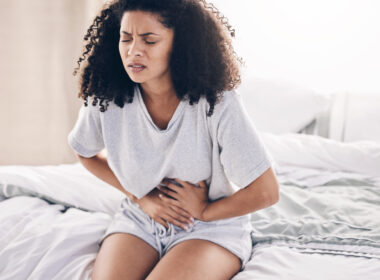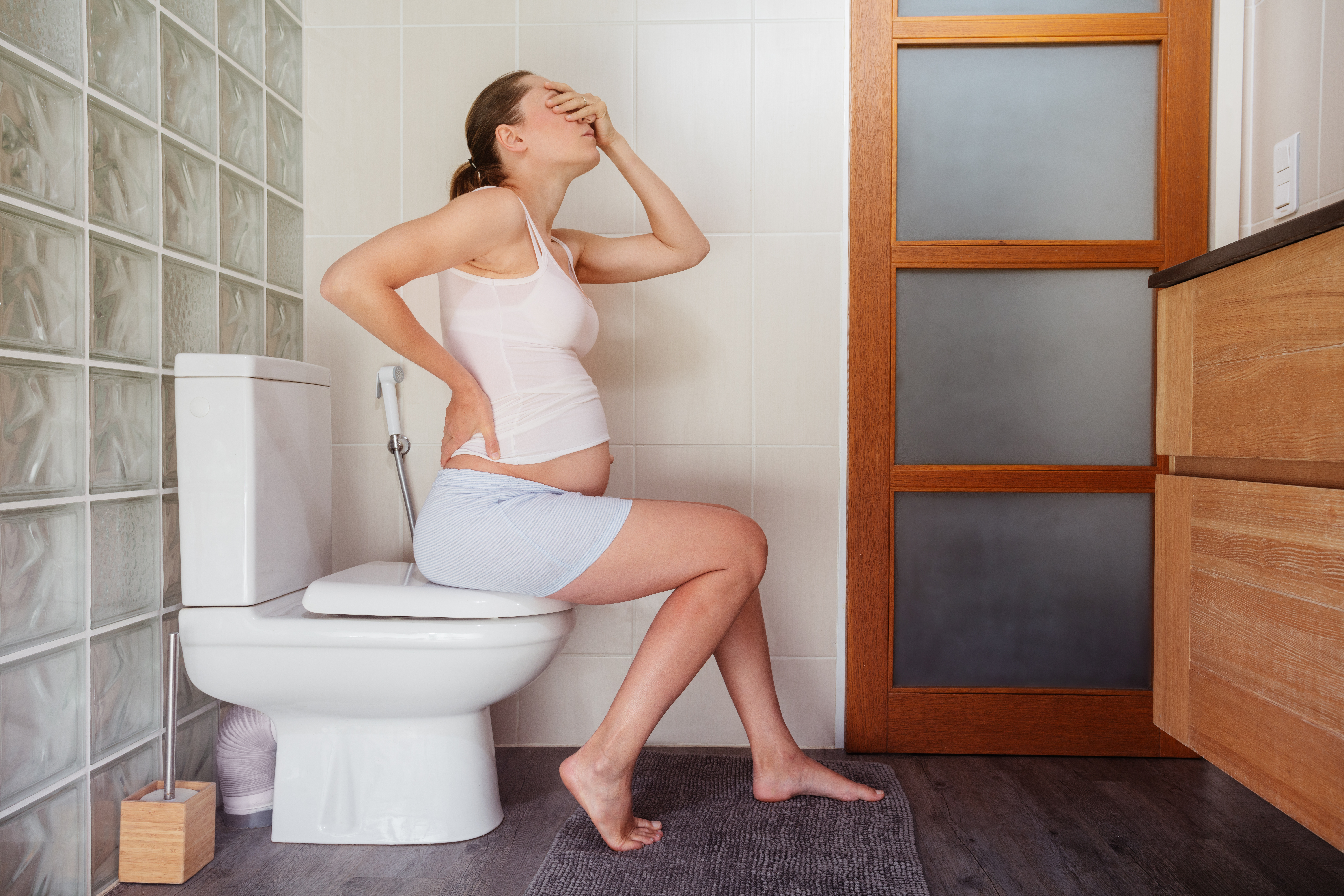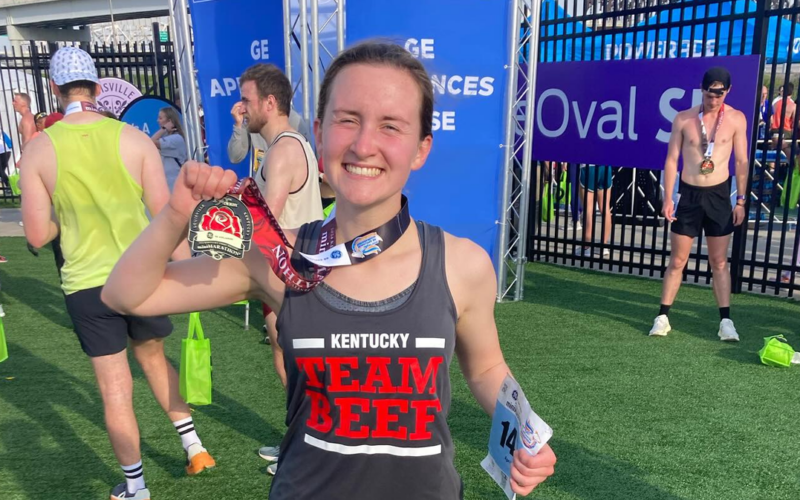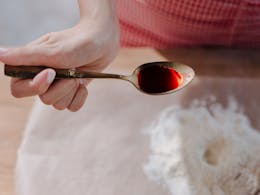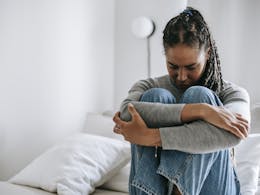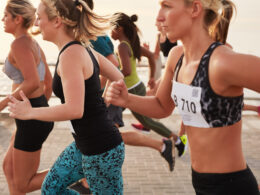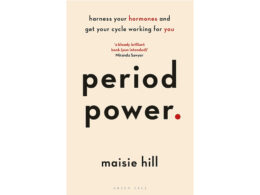My experience with disordered eating, body dysmorphia, and amenorrhea began in middle school. I was a cross-country runner, and despite making every practice, it seemed I just couldn’t progress past a certain point in my performance. It didn’t help that I hit puberty far before I reached double digits, age-wise. Compared to the other thirteen-year-old girls, I already looked like a woman. In my mind (and, to a degree, probably reality, too), it was my developed body that prevented me from attaining athletic “success.” This conclusion in my teenage brain drove me to pursue weight loss to the point of harming my body.
Secondary amenorrhea, which is when a woman who has already had her first period ceases to have it for three or more months, is often caused by low body weight or insufficient calorie intake. It is also one of the three components of the female athlete triad, which consists of amenorrhea, low bone density, and disordered eating [1]. The female athlete triad is especially prevalent in sports that value leanness, such as distance running, ballet, and gymnastics. This triad is exactly what I fell into in my efforts to become a faster runner. I only wish I would have recognized then that success was not determined by how many races I won.
As I progressed into high school, I became more and more focused on achieving leanness to become a stronger runner. I would scrupulously count calories and weigh my food (as well as myself), and I over-exercised to an extreme. The more successful female athletes on my team—although varying in size and build—all tended to be on the leaner side, and this only motivated me to be more strict with myself. My efforts to become a stronger runner eventually led to a full-blown eating disorder, accompanied by body dysmorphia, low body weight, amenorrhea, and a plethora of injuries. But before this happened, it actually seemed like my efforts were working.
For a while, disordered eating and overexercise seemed to be helping me
My freshman cross country season went very well. Having been homeschooled until high school, I had never competed on a public school sports team, and my coaches were ecstatic with my performance. I was the third of five finishers on our team (which placed fourth at the state cross country meet), and their projections for the next three years were optimistic. What they didn’t realize at the time was that I had not had a period for most of the season. Then, as the spring track season approached, I began to get repeatedly injured.
What I thought was a horrible case of shin splints (and which I now suspect was actually a stress fracture) knocked me out of that entire track season. The following fall, severe tendonitis in my knee prevented me from competing. At this point, my period had been inconsistent for over a year. My parents and doctor made the decision that I could not safely compete for the next twelve months.
I had no idea periods were an indicator of overall health
At the time, I did not realize how significant my period was for my overall health. I had heard a little bit from my mom, who was training to be a Marquette method NFP instructor, but I didn’t grasp the potential long-term effects of amenorrhea. If anything, my period seemed inconvenient. I was happy not having to worry about it starting unexpectedly or having any period-related pains or side effects.
Plus, above all, I liked looking lean and “fit.” The thought of needing to put on any amount of weight to get my period back was scary. I still remember the day my parents asked me to trust them to help me with portion sizes, and I thought my world was ending. But what I didn’t know was that the light at the end of recovery was far brighter than any joy or satisfaction that being skinny could bring.
Fast forward to now, and I am proud to say that I have not missed a period in over five years! It was a challenge to get here, but learning to respect my body and the way it’s made was such an important lesson for me to learn. As I recovered from my eating disorder, I began to learn more about my cycle and how much I absolutely need one to thrive. Living without a monthly period is like turning off the thing that allows me to flourish as a woman!
I’m performing better now with my period and without the disordered eating and over-exercise
As far as athletic pursuits go, I’ve been pleasantly surprised that my ability to perform now is considerably higher than it was before. I’ve been running consistently for four years now, (including four half-marathons and one full) with fewer injuries, faster times, and more energy than I was able to run a 5k in high school. I’ve shifted my focus from my appearance to my well-being, and the joy that I now find in running far outweighs the importance I used to place on the number on the scale.
I’ve been pleasantly surprised to see how much fertility awareness has helped me as a runner. Charting my cycle and adjusting my training accordingly has seemingly made my training more effective, and helped me to feel more energized throughout the month. During the follicular phase of my cycle (the time leading up to ovulation), I have more energy and am usually better able to tackle a long run, but during the luteal phase (from ovulation to my next period), I’ve learned that it is better to not push myself too hard. I never would have believed it before (I previously thought that I should always go as hard as I could), but working with my body and my cycle (and having a consistent, healthy period) has actually made me a better runner!
Leanness isn’t the end-all, be-all for female athletes
In sharing all of this, it is my hope that if you’re a runner with amenorrhea, or really any woman or teen who is battling an eating disorder or experiencing body dysmorphia, you can see that health and fitness isn’t all about leanness. Our bodies can thrive when given the things they need to function properly, and if I’ve learned anything, it’s that it’s not worth sacrificing your period for performance. You will be a happier, healthier person who is better able to flourish when your body is able to flourish! And you might even find that you feel better too, since we really are our best when we have our periods.

